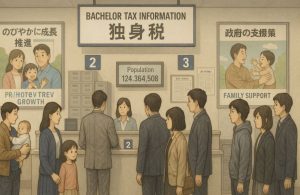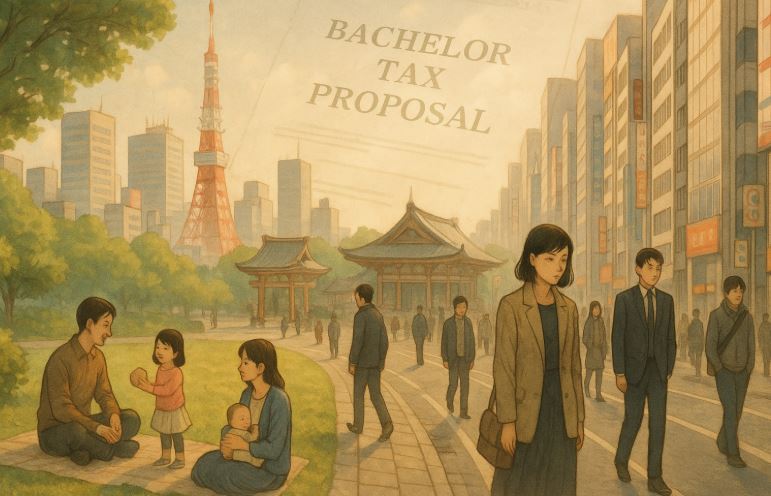The idea of a “Bachelor Tax” may seem like a relic of the past, but recent discussions about its potential implementation in Japan have sparked global curiosity.
With Japan facing a significant population crisis, lawmakers and social commentators are debating unconventional methods to encourage marriage and boost birth rates.
Among these proposals is the controversial concept of taxing single, unmarried individuals, a strategy that has been employed in various forms throughout history.
This article delves deep into the notion of the Bachelor Tax in Japan, exploring its historical context, recent news, societal impact, and the debates that surround it.
What Is Bachelor Tax?

A Bachelor Tax is a government-imposed tax on unmarried individuals, typically aimed at encouraging marriage and boosting population growth.
Historically, countries like the United States, the Soviet Union, and Italy have used bachelor taxes as a policy tool to address declining birth rates and incentivize family life.
These taxes often targeted men of marriageable age who were not contributing to population growth through family structures.
Historical Context of Bachelor Taxes
- In the Roman Empire, Emperor Augustus introduced a tax on bachelors over the age of 25 as part of the “Lex Papia Poppaea” law to promote marriage.
- In 1695, England implemented a “Marriage Duty Act” that taxed bachelors over the age of 25.
- The Soviet Union’s “Tax on Childlessness,” established in 1941, required childless men and women over a certain age to pay additional taxes.
While the specifics varied, the common goal was to use economic pressure to influence social behavior. In many cases, the taxes were seen as punitive, disproportionately affecting lower-income individuals who found marriage financially challenging.
Why Was the Bachelor Tax Introduced Historically?
Bachelor taxes have been introduced historically for both economic and social reasons. Governments often linked the idea of marriage with societal stability and economic growth. By taxing unmarried individuals, policymakers aimed to:
1. Boost Population Growth
Countries facing declining birth rates saw bachelor taxes as a means to encourage marriage and, subsequently, larger families. More marriages typically led to more children, which was seen as vital for economic stability and military strength.
2. Strengthen Family Units
Traditional beliefs often viewed marriage and family as the cornerstones of a stable society. Bachelor taxes were used to incentivize marriage and strengthen family units, which were seen as responsible for raising the next generation.
3. Address Labour and Military Needs
In periods of war or economic downturn, governments promoted family growth to ensure a steady supply of workers and soldiers. Marriage and childbearing were seen as contributions to the nation’s workforce and military power.
4. Financial Incentives for the State
Bachelor taxes also served as a revenue source for governments. By taxing unmarried individuals, states collected additional funds that could be redirected toward public services and family benefits.
Bachelor Tax Japan – Latest News?

Recent discussions around the implementation of a Bachelor Tax in Japan have raised eyebrows both domestically and internationally.
Japan’s ongoing struggle with a low birth rate and aging population has pushed policymakers to consider unconventional strategies. Though not officially implemented as of 2025, the debate continues with increasing intensity.
Current Public Discourse
- Public forums and media platforms like Reddit have seen heated discussions on whether a Bachelor Tax could help reverse Japan’s population crisis.
- Some political figures have hinted at supporting policies that encourage marriage, though none have explicitly committed to a Bachelor Tax.
Government Position
As of 2025, the Japanese government has not passed any legislation to enforce a Bachelor Tax, but discussions are ongoing. Some regional leaders have expressed interest, citing successful historical examples from other nations.
Social Reactions
Public opinion remains divided. Proponents argue that it could stimulate family growth, while critics see it as a violation of personal freedom. Activists have also raised concerns about the impact on low-income singles who might struggle to afford additional taxation.
Is There Really a Bachelor Tax in Japan?
Contrary to circulating rumours, Japan has not officially implemented a Bachelor Tax. However, the concept has been floated by some political figures and social commentators as a potential solution to the country’s declining birth rate. While there is no formal legislation, the idea continues to be discussed in policy circles.
Understanding the Rumours
- Social media platforms have contributed to misinformation regarding the existence of a Bachelor Tax in Japan.
- Political debates have occasionally referenced the tax as a possible measure, leading to confusion among the public.
Current Alternatives in Japan
Instead of a Bachelor Tax, Japan currently relies on incentives for married couples and families, such as:
- Tax breaks for married couples
- Child allowances for families
- Subsidized daycare and education support
While these measures aim to encourage marriage and family growth, they have yet to produce significant changes in birth rates.
What Are the Main Arguments for Implementing a Bachelor Tax in Japan?

Proponents of the Bachelor Tax argue that it could serve as an effective tool for reversing Japan’s declining population trend. The primary arguments in favor of such a tax include:
1. Encouraging Marriage and Family Growth
A Bachelor Tax would economically incentivize individuals to marry, theoretically leading to more families and higher birth rates.
2. Addressing the Aging Population Crisis
Japan’s elderly population is growing rapidly, placing a burden on social services. Proponents argue that increasing the younger population through marriage and childbirth is crucial for long-term stability.
3. Financial Support for Government Programs
Revenue collected from a Bachelor Tax could be redirected to social programs that support families, childcare, and education, further encouraging family growth.
4. Cultural Reinforcement
In a society where family is traditionally valued, some believe that the Bachelor Tax would strengthen cultural norms and societal expectations surrounding marriage.
What Are the Criticisms Against the Bachelor Tax in Japan?
Despite its intended goals, the Bachelor Tax has faced significant criticism from various social groups and economic analysts.
1. Infringement on Personal Freedom
Critics argue that forcing individuals to marry through taxation violates personal choice and autonomy. Japan, as a modern democracy, may face backlash for implementing such socially coercive policies.
2. Economic Strain on Singles
Unmarried individuals, particularly those from low-income backgrounds, may struggle to bear the additional financial burden. The policy could disproportionately affect those who are financially unstable or unable to find suitable partners.
3. Ineffectiveness in Addressing Core Issues
Many argue that the Bachelor Tax does not address the root causes of Japan’s declining birth rate, such as economic instability, high cost of living, and career-focused lifestyles.
4. Social Backlash and Alienation
There is concern that such a policy could lead to social division, alienating singles and contributing to societal stigma against unmarried individuals.
What Can Japan Learn from Other Countries That Had a Bachelor Tax?

Bachelor taxes are not unique to Japan; several countries have experimented with this policy in the past, with varying degrees of success. Looking back at these international experiences offers valuable insights into what might work, and what might not, in the Japanese context.
1. Soviet Union – Tax on Childlessness (1941–1991)
- Implemented during Stalin’s era, the Soviet government taxed men aged 20–50 and women aged 20–45 if they did not have children.
- The tax aimed to boost population growth but was criticized for punishing those who were infertile or unable to marry.
- The policy did not significantly impact birth rates, suggesting that economic incentives alone are insufficient.
2. Italy – Fascist-Era Bachelor Tax (1927–1943)
- Introduced by Mussolini as part of his campaign to increase the Italian population.
- Single men aged 25 and older were subject to the tax.
- Despite the pressure, it did not achieve the population boom Mussolini anticipated, and many saw it as socially punitive.
3. United States – Bachelor Taxes at State Levels
- Some U.S. states experimented with bachelor taxes during the late 19th and early 20th centuries.
- These taxes were often minimal and phased out as societal views on marriage evolved.
Will Japan Really Implement the Bachelor Tax in the Future?
The idea of a Bachelor Tax in Japan remains speculative as of 2025, but growing public discourse and political hints suggest it is not entirely off the table.
The Japanese government has been exploring various strategies to combat its declining birth rate, and while direct taxation on singles has not been formalized, it continues to be a topic of interest.
Political Climate and Policy Discussions
- Some regional politicians have publicly supported the idea, citing historical examples as potential models.
- Legislative committees have considered the policy among other proposals, though concrete steps have yet to be taken.
Public Opinion and Social Media Reactions
- Online platforms such as Reddit have become battlegrounds for debates on the Bachelor Tax’s effectiveness and ethical implications.
- Polls indicate mixed reactions, with some supporting incentives for marriage but opposing punitive measures for remaining single.
Economic Feasibility and Government Readiness
- Economic experts suggest that while a Bachelor Tax could generate revenue, it may not solve the root causes of Japan’s low birth rate.
- Policymakers are also cautious, aware of the potential backlash and economic strain on younger populations.
Conclusion
The concept of a Bachelor Tax in Japan is steeped in historical precedence and modern-day urgency.
As the nation grapples with a rapidly aging population and declining birth rate, innovative solutions are being explored, including the controversial idea of taxing unmarried individuals.
While the policy remains speculative as of 2025, it highlights Japan’s desperate need to address its demographic crisis.
The effectiveness of a Bachelor Tax, however, remains debatable, given historical lessons from other nations and the social complexities of modern Japanese society.
If Japan does decide to move forward with this policy, it would need to be part of a broader strategy that includes social support, economic reform, and cultural change to truly be effective.
FAQs
Is the Bachelor Tax already in effect in Japan?
No, Japan has not officially implemented a Bachelor Tax as of 2025. However, discussions are ongoing among political and social commentators.
What is the purpose of a Bachelor Tax?
The primary goal of a Bachelor Tax is to encourage marriage and family growth by imposing a financial penalty on unmarried individuals.
Has a Bachelor Tax worked in other countries?
Historically, countries like the Soviet Union and Italy have tried bachelor taxes, but with limited success in boosting long-term population growth.
Would a Bachelor Tax help Japan’s population crisis?
While it may encourage some individuals to marry, experts argue that deeper economic and social reforms are necessary to significantly impact birth rates.
How would a Bachelor Tax affect single people financially?
Unmarried individuals would face additional taxation, potentially increasing their financial burden. This could discourage spending and affect economic growth.
Are there other alternatives being considered by the Japanese government?
Yes, Japan is also considering incentives for families, subsidized childcare, and housing benefits to encourage marriage and childbearing.
What are the criticisms of a Bachelor Tax?
Critics argue that it infringes on personal freedom, disproportionately affects lower-income individuals, and fails to address the root causes of declining birth rates.









